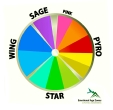





DISCLAIMER: Growing Awareness Pty Ltd as publishers of this web-site and John Bligh Nutting do not dispense or recommend medical or psychiatric advice, nor prescribe the use of any technique as a form of treatment for any diagnosable medical or psychiatric conditions. Any such action should only be taken either directly or indirectly on the advice of a physician or a qualified therapist.
Website design copyright © John Bligh Nutting and Growing Awareness Pty Ltd -2010 2014 All rights reserved World wide
Privacy Policy click here
It’s OK to feel “young at heart” as long as your emotional tool bag
doesn’t feel too empty or too disorganised at the same time


Signs that your younger emotional systems are trying (a bit too hard)
to fix things ….
Typical thoughs, feelings and actions
1. “It’s all my fault “So I have to ......” ; “So, I must ....” thoughts and feelings
2. Thoughts and feelings that tell me “I am not good enough because .....”
3. Making negative Forecasts and Predictions that set up even more “.....So I have to .......So I must ....” pressure inside me.
4. Reactions too intense, too fast, too dramatic or too loud.
5. Feeling Lost and Vulnerable - No way out – defeated or devastated. Can’t do it any more.
6. Seeking Solutions that exist ‘Outside of Me’ - “It is they who have to change”.
7. Repeated Patterns of Self defeating behaviour (RSDP) - shooting one’s self in the foot.
8. Distorting what is really going on around me. Exaggerating, denying, blaming. Separating from reality.
9. Polarised or Black and White thinking. “It’s all my fault” flipping suddenly to “I had nothing to do with it!.”
10. Back to Front Activity. Flipping between two wide apart and very opposite positions - unbalanced energy. “If I can’t have it all then I Fling it all Away”.
11. Change is scary and confusing. I don’t want to change me, but I have to. I try hard to change things outside of me, but I can’t.
12. Confusion about self-empowerment “I wish I was more self-empowered but I am scared. I would not know how to fit in, if I had more power.”
13. Not Noticing things that I should be noticing
14. Body pain in a specific part of the body - an “un-healed emotional wound”.
15. Things go wrong too often
* If an emotionally younger part is often unhappy you will often feel unhappy.
* If an emotionally younger part is lonely you will often feel lonely.
* If an emotionally younger part feels abandoned you will feel very sad or very uncomfortable when someone abandons you
* If an emotionally younger part feels smothered you may feel panic or extreme discomfort when someone gets too close to you emotionally
* If an emotionally younger part is frightened you will feel blocked, trapped, unable to move or make the positive changes in your life or achieve what you really want to with your life. Yet these are the changes you want, the changes that really make a difference.
* If an emotionally younger part often feels forgotten you will feel out of touch, unsure of who you really are.
* If an emotionally younger part feels that he or she is the only part of you that can solve your problems you will notice yourself using solutions that are more like a kid's way than a grown-up's.
* If an emotionally younger part does not feel loved and protected by you (his or her grown-up self) you will have difficulty giving or receiving love. Linking really closely with others who love you will begin well but it will keep on breaking down.
* If emotionally younger parts do not feel they have any value they get trapped in power and control games which often involves them in attempts to devalue or disempower other people.
• It is natural for emotionally younger parts to spend much more time feeling than they spend thinking.
• When emotionally younger parts think, they think like small children, for example, there are only two ways, the right way or the wrong way with little or nothing in between. It is not fair to expect them to think like a grown up.
• Whenever you find yourself using the phrase “I have to ....” it is worth checking the accompanying feeling. If it feels like a small child speaking, that is another sign that your emotionally younger parts are still trying to do too much “grown-ups work” too often.
• If you fail to recognise an emotionally younger part it will make sure you suffer for your failure (until you recognise it regularly as a grown up should).
• If you fail to protect an emotionally younger part it will make sure you suffer for your failure (until you start to look after that part and protect it as a grown up should).
• If your youngest emotional systems parts are trying to protect you they will work hard and in as best ways they know how. That will leave you in a very vulnerable state
| Explaining Your EA Wheel |
| Put Your EA Wheel to Work |
| What's It Like in your Blue WING Zone |
| What's it like in your Green STAR Zone |
| What's it like in your SAGE Zone |
| Case Study |
| Free DIY Profile sheet |
| Bibliography |
| More signs |
| Young Systems at Work |
| Neighbours |
| About Us |
| Talk with me Phone Skype or E-mail |
| Starting point |